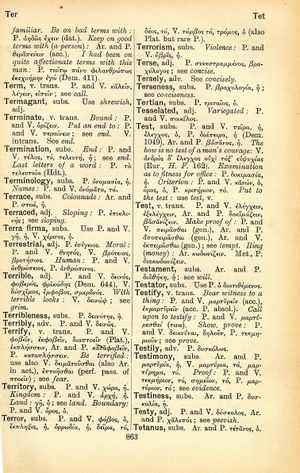tetanus: Difference between revisions
From LSJ
Μιμοῦ τὰ σεμνά, μὴ κακῶν μιμοῦ τρόπους → Graves imitatormores, ne imitator malos → Das Edle nimm zum Vorbild, nicht der Schlechten Art
(D_9) |
(3_13) |
||
| Line 9: | Line 9: | ||
{{Gaffiot | {{Gaffiot | ||
|gf=<b>tĕtănus</b>, ī, m. ([[τέτανος]]), contraction des nerfs, crampe, tétanos : Plin. 23, 48 ; 31, 122. | |gf=<b>tĕtănus</b>, ī, m. ([[τέτανος]]), contraction des nerfs, crampe, tétanos : Plin. 23, 48 ; 31, 122. | ||
}} | |||
{{Georges | |||
|georg=tetanus, ī, m. ([[τέτανος]]), die Halsstarre, der Tetanus, Plin. u. Scrib. – Dav. [[tetanicus]], a, um ([[τετανικός]]), [[mit]] der Halsstarre [[behaftet]], Plin. 20, 239 u.a. | |||
}} | }} | ||
Revision as of 09:46, 15 August 2017
English > Greek (Woodhouse)
subs.
Ar. and P. τέτανος, ὁ.
Latin > English (Lewis & Short)
tĕtănus: i, m., = τέτανος,>
I a stiffness or spasm of the neck, tetanus, Plin. 23, 1, 24, § 48; 31, 10, 46, § 122; Scrib. Comp. 101 (in Cels. 4, 3, written as Greek).
Latin > French (Gaffiot 2016)
tĕtănus, ī, m. (τέτανος), contraction des nerfs, crampe, tétanos : Plin. 23, 48 ; 31, 122.
Latin > German (Georges)
tetanus, ī, m. (τέτανος), die Halsstarre, der Tetanus, Plin. u. Scrib. – Dav. tetanicus, a, um (τετανικός), mit der Halsstarre behaftet, Plin. 20, 239 u.a.

